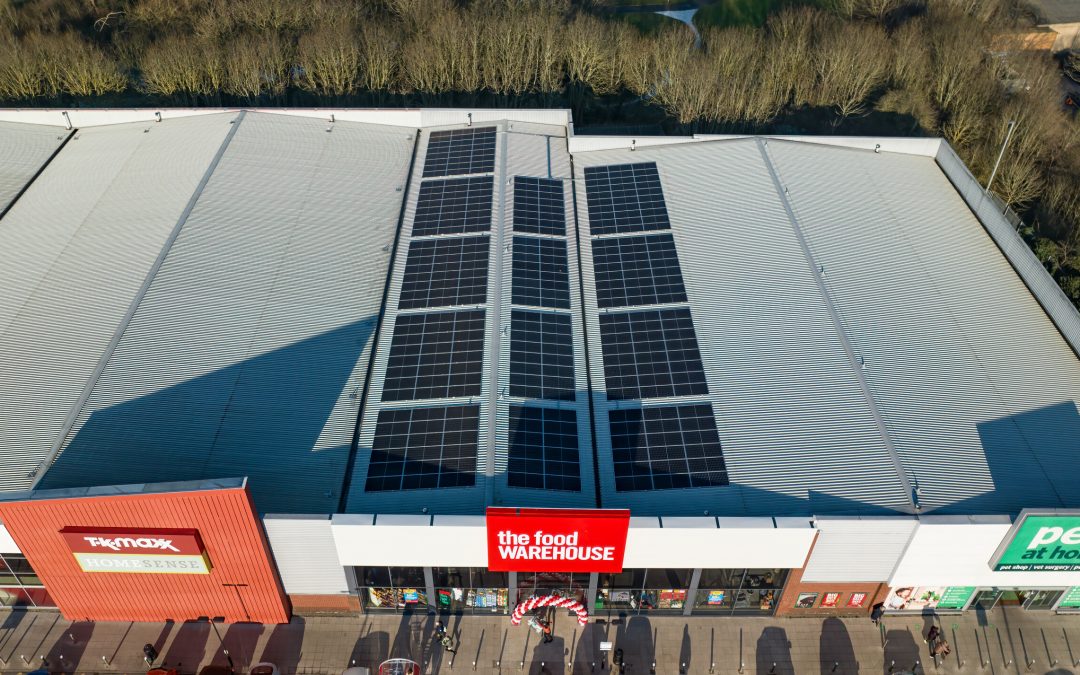Retail parks across the UK are sitting on a goldmine they haven’t yet tapped: their expansive roof space. With the UK’s solar capacity expected to reach 18.1 GW by April 2025, retail parks represent one of the most promising opportunities for commercial solar adoption. Here’s why investing in solar PV for retail parks makes compelling business sense.
Why Retail Parks Are Perfect for Solar
Retail parks are practically designed for solar success. Their large rooftops provide unobstructed space for hundreds of kilowatts of solar capacity without affecting operational space. Unlike high-rise buildings, there’s minimal shading from surrounding structures, maximising solar exposure throughout the day.
The operational synergy is equally compelling. Retail parks typically operate primarily during daylight hours, when solar generation is at its peak. Stores run bright lighting, air conditioning, and refrigeration systems from morning until evening, typically 7 days a week, creating a perfect match between energy demand and solar production. This alignment means retail parks can directly consume most of their solar-generated electricity, amplifying cost savings.
From a planning perspective, rooftop solar on existing commercial buildings generally falls under permitted development rights, making installation straightforward. The aesthetic impact is minimal, as roof-mounted panels are largely invisible to customers, thereby preserving the property’s visual appeal.
The installations have little to no impact on the building’s operations during construction, with 98% of the work being external to the building.
The Financial Case: Strong Returns and Cost Savings
The numbers for retail park solar have never been more attractive. With UK businesses paying 15-25 pence per kWh in recent years, solar power represents significant arbitrage potential.
Consider a typical retail park installing a 500 kWp solar array. Such a system might generate approximately 450,000 kWh annually, potentially offsetting around £81,000 (based on a conservative estimate of 18 pence) in energy costs at current electricity rates. With installation costs having fallen by 70% over the past decade, many systems achieve payback periods of 5-7 years, delivering an ROI of 10-15% annually.
UK businesses benefit from significant tax incentives, including the Annual Investment Allowance (AIA), which allows businesses to deduct up to 100% of solar installation costs (up to £1,000,000) from taxable profits. This could save a company up to 25% on corporation tax.
Beyond Bill Reduction
Solar installations deliver value beyond immediate cost savings. Properties with solar panels often command higher valuations due to proven lower operating costs and future-proofing benefits. There’s growing evidence of a “green premium” where tenants and investors pay more for sustainable assets.
Tenant demand increasingly favours solar-equipped properties. Major retail chains have strong ESG commitments and carbon reduction targets. Offering retail units with on-site renewable energy can provide a competitive advantage in lease negotiations and potentially justify premium rents.
Solar also provides energy resilience. While not eliminating grid dependence entirely, solar reduces reliance during peak times and offers protection against future energy price volatility – a lesson many learned during recent energy crises.
Car Park Solar: The Next Frontier
The UK government is actively exploring the potential to mandate solar canopies in car parks, with research suggesting that an 80-space car park could save around £28,000 annually. Solar carports are already mandatory in some European countries, including France and Slovenia.
For retail parks, car park solar canopies offer dual benefits: additional power generation and enhanced customer experience through shaded parking. They also support the growing EV charging infrastructure, with solar potentially powering charging stations.
Notable examples include the Metrocentre in Gateshead, which has over 5,300 rooftop and carport solar panels providing 40% of its annual electricity usage.
Financing Options Make Solar Accessible
Various financing models make solar accessible regardless of capital constraints. Traditional self-financing yields the highest returns, but Power Purchase Agreements (PPAs) eliminate upfront costs while providing immediate savings. Under a PPA, third parties install and own the panels, selling electricity at fixed rates below grid prices.
Government support continues through business rates exemptions for renewable installations and the Smart Export Guarantee for selling excess power. With panel costs continuing to fall and flexible financing available, there has never been a better time to invest.
Future-Proofing Your Assets
Solar represents more than an energy investment – it’s future-proofing. The UK government aims to increase solar capacity nearly fivefold to 70GW by 2035, with commercial rooftops playing a crucial role.
Regulatory trends point toward sustainability requirements, from carbon reporting to improved EPC ratings. Installing solar positions in retail parks ahead of these requirements while demonstrating environmental leadership to stakeholders.
Taking Action
For retail park owners and investors, the question isn’t whether to invest in solar, but when. With substantial financial returns, tenant demand for sustainable properties, and supportive government policies, solar PV represents a strategic asset that enhances both financial performance and environmental credentials.
The extensive roof space sitting unused on retail parks across the UK represents enormous untapped potential. By harnessing this space for solar generation, property owners can transform a cost centre into a revenue generator while contributing to the UK’s net-zero journey.
Ready to explore solar for your retail park? Contact us to assess your property’s potential and guide you through available financing options and incentives.

